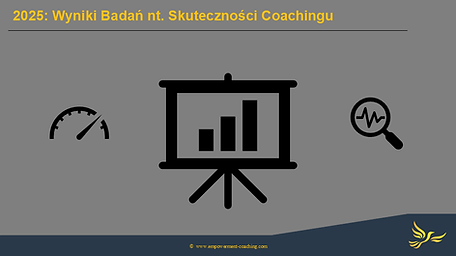
Knowledge about Coaching and Mentoring.
Each of the sections listed below is a separate whole and contains exhaustive knowledge of the selected area of Coaching or Mentoring. The information on Coaching and Mentoring presented is based on reliable sources, refers to standards set by the world's leading Coaching and Mentoring organizations, and includes links to relevant websites, reports, research results, and books.
What you will find in our Coaching and Mentoring Knowledge Library.
By clicking on the appropriate section below, you will go to a dedicated subpage, where you will find comprehensive summaries presenting the following areas of knowledge on Coaching and Mentoring:
-
Coaching vs. Mentoring - a comprehensive comparison of these two methods.
-
Explanation of available Types of Coaching.
-
A precise description of the most popular Coaching Models and the differences between them.
-
Comprehensive tips on what to look for when choosing a coach.
-
Summary of the benefits of Coaching, both Business Coaching and Life Coaching.
-
A list of the most dangerous Coaching Mistakes with commentary.
-
Manager as Coach - differences between managers unconsciously focused on quick problem solving and managers using the coaching style of management.
-
A set of articles describing the History and Development of Coaching, including biographies of such significant figures as Tim Gallwey, Sir John Whitmore or prof. David Clutterbuck.
Coaching and Mentoring Journey by Sir John Whitmore.
These are extensive excerpts from an article that was published by business coaching co-founder Sir John Whitmore in 2008. This article demonstrates the far-reaching consequences of coaching and mentoring.
Considering the date of its publication, it exemplifies the remarkable insight and knowledge of its author.
The five provocative statements Sir John Whitmore shares at the end of this article are powerful and force you to reflect on the following topics:
-
Consumerism vs Sustainability.
-
Knowledge (technology) vs. Wisdom.
-
Quantity vs. Quality.
-
Hierarchy vs. Self-responsibility.
-
The future of coaching.
Coaching. Where do we come from? Where are we heading?
I had no idea what I was getting into back in 1979 when, with the support of Tim Gallwey and three colleagues, I started a little London-based tennis and ski school called The Inner Game. Our attempts to break into the tennis and ski teaching establishments were rejected (they thought that what we were doing was weird), so we set up successful independent recreational courses for adults in both.
The training manager of IBM (UK) came on a tennis course, loved it, and invited us to run a tennis day in a week-long training for managers, as he believed that what we were doing would be transferable to the workplace. We did, and it was, and so the journey began.
Some years later, after several incarnations, we ceased to use The Inner Game name as it did not describe, to the world at large at least, what we were doing. Since we were all from a sports background, Tennis, Skiing, Motor racing, Athletics, and Hockey, the obvious word to use was coaching. With hindsight, that may have been a mistake because the way we taught was diametrically opposed to the conventional instructional method that the term coaching was identified with, and with which plenty of people had had bad experiences. To invent a new word, coaching might have been better. However, the non-sport use of the term coaching is now becoming so widespread that it may in turn be changing the definition of the word for (the) good.
However, we stuck with it then, and it so happened that at about that time, Life Coaching emerged in California using similar principles also based in humanistic psychology, and the term was set. Little did we know then how big coaching would become, particularly in the workplace.
(...) Currently, Coaching is being enriched in quality too, with many Academic programmes and degrees available, a wider variety of applications, and the clamour worldwide for deeper transpersonal-based coaching. Where is this later need coming from?
From deep inside the human soul.
So many of us have a yearning for more freedom of choice about our own lives and about the world we live in. This is why many people drop out of conventional work to become coaches, and this is what many of our clients want, too. We see the mess the world is in; we read about the failings of our political and corporate leaders on the news every day, we see and are even beginning to feel the environmental degradation, and we are appalled by the social injustice that is rife still today.
What has gone wrong, and who is going to put it right? We have, and we are.
Our so-called leaders cannot, for they know not how. That sounds dramatic and hugely presumptuous, but wait; there is help on the way, and it is called evolution.
Just as, according to Darwin, biology adapts over time and becomes ever more complex and sophisticated, so does our psychology, or rather our psycho-spirituality, both collectively and individually. That is the story, and the only argument is, is this a genetic programme, or did someone write the script? The answer to that depends not so much on the reality, which is unlikely to be knowable in our lifetime anyway, but on our perspective, or the story we choose to live by.
The view of the level of collective psychosocial evolution of the many cultures on our planet is a very sensitive subject, and it will depend upon the criteria by which we make the assessment.
Some people will do so, on economic grounds, and trumpet white Caucasians' supremacy, but on the other hand, some indigenous tribes have discovered ways of living harmoniously to which we are yet to aspire, and Asians who are already showing us the way intellectually by other criteria. Asians, incidentally, don’t differentiate between psychological and spiritual development, but see it as the continuum that it is, so for them, the transpersonal is normal.
Lump humanity together, something that has been enforced by the single global economic system and the internet, and we can see a collective trend, reflecting the predicted emerging stage of human evolution.
That trend is the inevitable crumbling of hierarchy and autocratic dominance, and the rise of the demand for, and the reality of, personal choice and self-responsibility.
Human beings are now ready for that, but all change like this generates defiant resistance, and a breakdown before the build-up. This is where humanity is. It is into this underlying evolutionary trend that coaching was born.
The hierarchy of religion will decline and self-determined spirituality will rise, as indeed it already is, and the need and search for meaning and purpose becomes more universal. Hence, more urgent need for coach training to include transpersonal capability.
Of course, the language of Coaching will change, too. The methods will be so integrated into education and management in time that they become the norm, and the word coaching will be dropped for those applications.
But let us shrink to the micro for a moment since the theme of this issue is language, and I don’t want to miss an opportunity to make a point.
Coaching questions need to be absolutely clear and unambiguous, and that is helped by keeping them brief and singular. Many coaches have also discovered that the English language is rather sloppy, or at least the way we use it can be. One question that I think should be banned is, “How did that feel?” The alternative, “What did you feel when that happened?” is fine – and if you can’t see the difference, take a day off from coaching to figure it out.
While on the subject of feeling, we also often fail to differentiate between feeling and thinking, for example, “I feel that you were ….” is a thought, not a feeling. “I feel sad, happy, pain, etc.” is a feeling.
But now back to the macro. I conclude with five provocative big picture statements for you to mull over and consider how they may affect your clients now and influence your coaching into the future.
Consumerism is all about acquiring more and more, and Sustainability is about using less and less. The two are not compatible and never can be, as a subconscious part of the evolutionary script, but also more consciously as a service to meet a growing need. So here we are, the pioneers of a fledgling industry that will expand beyond our wildest dreams in the coming decades. It will be embodied into education at all grades, management of all kinds, health and other care delivery, politics, and diplomacy in time.
-
Consumerism is all about acquiring more, and more, and Sustainability is about using less and less. The two are not compatible and never can be.
-
Knowledge (technology) progress has run ahead of our Wisdom to use it responsibly. For example the arms trade and pornography are the main fuels of the technology industry.
-
Our obsession with the acquisition of Quantity with early obsolescence has caused us to lose the appreciation of Quality, and even much of our ability to manifest it.
-
Hierarchy is diminishing and Self-responsibility is destined to replace much of it, once we have learned how to be self-responsible from the mistakes we will make, and we emerge from the inevitable period of accompanying social breakdown.
-
Coaching is the only non-stigmatised industry (not marginalised like psychotherapy or spiritual teaching) that is specifically geared to building selfresponsibility in people. The future of Coaching is only limited by our own self-limiting beliefs.
Development of Coaching and Mentoring in recent years.
Coach vs. Mentor. How much do the differences blur?
After reading the studies provided here, you will realize that there are great similarities between Coach and Mentor, and these two roles are now often combined. Both are expected to: appropriate knowledge and experience; both must be able to actively listen; be masters of communication, creating and maintaining relationships; have the ability to understand both the work environment and the personal environment of the coachee; ask the right questions; refer coaches to other sources of assistance where appropriate; identify, agree and set goals; support in the development of action plans to achieve goals; help monitor and revise plans; and finally, knowing when it's time to end a coaching or mentoring relationship.
It is therefore worth emphasizing that the Coach works with individuals and organizations to help them achieve a higher level of performance and/or achieve other mutually agreed goals. The coach will necessarily take into account past results and events, but will focus on actions and goals for the future. This approach is action- and goal-oriented, focusing on where the coachee is now, where he wants to be in the future, and how best to get him there.
In fact, this framework is familiar to those involved in strategic planning or project management, as it is the foundation of both approaches. The coach follows a similar structured approach and builds on it to develop an action plan to support the coachee in achieving his goals.
In conclusion, the roles of Coach and Mentor have developed dramatically in recent years. However, these changes are generally perceived as positive, and now Coaching and Mentoring are recognized as a very good practice in the development process, both for individuals and organizations.
Of course, every effort should be made to ensure that the Coach or Mentor and all undertaken activities are properly selected for a specific client. As we mention in many places on our website, a coaching or mentoring relationship is a very individual, one-of-a-kind journey.
Assuming that the above condition is met, both Coaches and Mentors have an important role to play in the development of individuals and organizations in today's business world. As the pace of change and business complexity increases, it is virtually certain that Coaches and Mentors will continue to play a key role in helping individuals and organizations manage this change and complexity more effectively.
















